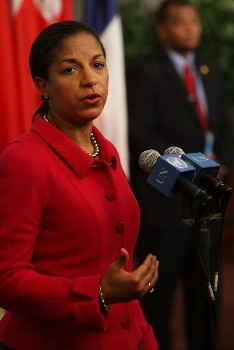‘Keep Silent’ on Darfur, Sudan tells US
November 30, 2009 (WASHINGTON) – The US administration should stay away from the crisis in the Darfur region if it is to be resolved, the Sudanese UN ambassador said today.
 “It is better if the US want to assist the peace process is to keep silent because they don’t have the information and the UN itself confirmed in no uncertain terms through the visit of Mrs. Malcorra [UN Under Secretary-General for Field Support, Susana Malcorra] last week in Sudan through the tripartite arrangement and mechanism that access is provided, that cooperation of Sudan with UNAMID is on course,” the Sudanese envoy Abdel-Mahmood Abdel-Haleem told reporters today at the UN headquarters.
“It is better if the US want to assist the peace process is to keep silent because they don’t have the information and the UN itself confirmed in no uncertain terms through the visit of Mrs. Malcorra [UN Under Secretary-General for Field Support, Susana Malcorra] last week in Sudan through the tripartite arrangement and mechanism that access is provided, that cooperation of Sudan with UNAMID is on course,” the Sudanese envoy Abdel-Mahmood Abdel-Haleem told reporters today at the UN headquarters.
His statements came few minutes after his US counterpart Susan Rice criticized at the stakeout what she described as impediments made by Khartoum to UNAMID that was mentioned in the periodic report by the UN Secretary General.
“The United States is particularly concerned about the reports that we heard referenced in the Secretary-General’s report of some 42 instances in which UNAMID personnel and patrols have been denied freedom of movement and access” Rice said.
“These quite directly and seriously contravene the terms in the status of forces agreement that the government of Sudan has committed to. It impedes UNAMID’s ability to protect civilians and do its vital work and it is utterly unacceptable, as are the threats by the government of Sudan against UNAMID and its personnel, threats that are amply documented in the Secretary-General’s report. But we expect that the UN will continue the important and vital efforts of UNAMID occurring in the most difficult of circumstances and we expect that the UN will report fully, accurately and on a timely basis, not only about incidents that occur, but who is responsible for incidents when they occur” she added.
The UN ambassador also took a hit at Abdel-Haleem accusing him of “bullying”.
“The sort of efforts that we saw today by the Permanent Representative of Sudan in the Chamber to try to bully and intimidate the United Nations into not reporting fully and accurately, will not be tolerated. And we will insist on and continue to expect timely and full reporting on these incidents and clear accounting for who is responsible so that we and other members of the Security Council can employ this vital information in the implementation of our national and our collective policies” she said.
The Sudanese official objected to the “bleak” pictures presented in the report and claimed that his views were shared by half of the UN Security Council (UNSC) members.
The Deputy UN peacekeeping chief Edmond Mulet who briefed the UNSC today said that Darfur rebel forces also have made it difficult for UNAMID to carry out its mission.
“Similar commitments to UNAMID’s freedom of movement are required from the armed [rebel] movements with respect to their areas of control if UNAMID is to succeed in its mission of assisting the parties in re-establishing comprehensive peace and stability,” Mulet said.
The UN official noted that the opening of a new round of UN-backed talks on Darfur this month in the Arab Gulf state of Qatar coincided with an escalation of armed clashes between the rebels.
He gave examples in southern Darfur, where Sudanese Liberation Army (SLA) from the Minni Minnawi faction (SLA/MM) attacked two villages, killing 11 people, and a few days later on 19 November 29 Sudanese soldiers were ambushed and killed, with both SLA/Abdul Shafie and SLA/Abdul Wahid fighters claiming responsibility.
“These attacks are unacceptable and illustrate the extent to which the fragmentation of the Darfurian rebel movements continues to be a reality ¬– with obvious implications for the mediation and peace process,” Mr. Mulet said in the briefing on UNAMID.
The Assistant-Secretary-General told the Council that a number of groups in Darfur, including the rebel Justice and Equality Movement (JEM) and SLA/AW continue to express concern over the holding of national elections, slated for April 2010, before a peace agreement is reached.
In this connection, Mr. Mulet said that the “start of elections registration on 1 November led to heightened tensions in some areas of Darfur,” which he characterized as an unacceptable threat to the electoral process in Sudan.
This month Hussein Abu Sharati the spokesperson of Darfur IDP’s and refugees told Sudan Tribune that seven IDP’s were killed in West Darfur in a clash between the residents and government troops which attempted to force them to take part in voter registration process.
(ST)
